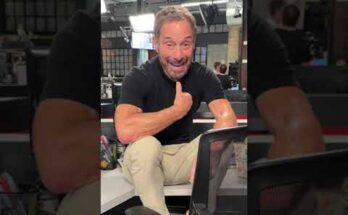Note: This interview originally ran as part of our coverage of the 2011 Tribeca Film Festival. Fun fact: Did you know Michael Cuesta is currently directing the fantastic Showtime series Homeland?
Channeling his love of 70s rock, Michael Cuesta explores the silver lining in one man’s failed future in Roadie, available on VOD Friday, December 2.
Tribeca: Roadie is not really a movie about rock’n’roll; it’s a sort of coming-of-age story for Jimmy, who hasn’t really accepted adulthood up until now. How do you describe Jimmy’s journey in Roadie?
Michael Cuesta: Fear is a big motivator in Roadie. Jimmy defines himself by what he does for a living [he’s a roadie for the band Blue Öyster Cult]. He puts a lot of stock in being better than the friends he grew up with and what his mother thinks of him. Having to come home to the neighborhood he grew up in, see his mother and old friends, is his worst nightmare. He knows that all of the things that he depended on for most of his life are about to crumble. He has to lie, do whatever it takes to stay afloat and keep his dream—his idea of who he is—alive. Little does he know, his life is about to begin again.

Tribeca: What inspired you to tell this story? Any metal-band stories in your past? Or a particular connection to Blue Öyster Cult?
Michael Cuesta: One motivator to make the movie was the idea of failure. Am I a failure? Have I achieved what I set out to do in life? Another was the passion for the music of the mid to late 70s. Half of my dinner conversations are about music, and I play my electric guitar in my basement almost every night. I figured it would be a good genre to mine. Blue Öyster Cult was one of my favorite bands back in the day. They were almost my first rock concert back in the 8th grade. Almost, because the day of the concert I was so overly excited, I worked myself up to the point of an anxiety attack. I left the show before BOC came on stage. I walked 7 miles to my house, cursing myself. I did finally see them a year later.

Tribeca: You and your brother Gerald write together—how does that work? Do you start with a blank page and work on drafts together? Or do you each take turns with drafts?
Michael Cuesta: We live in different states, so we spend a lot of time on the phone and video chatting. We usually break story and outline together. Gerald then takes the first draft, I take the second, and then we squabble over the third. We’ve co-written several scripts and TV pilots.
Gerald wrote a rough draft of Roadie years back about an ex-roadie who puts his own band together. It was more of a straight-ahead rock movie. I approached him with the idea of making it about his first day home after coming off the road—making it about him facing his past and why he left. I wanted to mix the coming of middle age genre with a rock movie.
Tribeca: You have a terrific cast—can you talk about how your casting process? Ron Eldard, Bobby Cannavale, Jill Hennessy, and Lois Smith all work wonderfully together.
Michael Cuesta: Ron and I met for coffee. He came to the meeting dressed in Jimmy’s garb. As we talked, he seemed to act just as I saw Jimmy. Maybe he was acting, maybe he was being himself—that, I’ll never know—but I was captivated by his passion for the project. Ron’s a tough and tender guy, perfect for Jimmy. There was not a moment in the dailies where I felt the need to cut away from him. He transformed, completely. He paid a nice compliment to the script. He said the reason why it was so easy to be Jimmy was the script. The words and situations felt right to him.
Bobby called me and said he really wanted to play the part. Bobby is very skilled. He brought an electricity and unpredictability to the movie. Because it was a very simple story with very little incident, he was needed to be the walking time bomb. Every time he’s in the movie, he puts you on edge. He was able to easily connect with the kind of guy he grew up: the borough ball buster guy who relishes in playing head games.
What can I say about Lois Smith? She liked the script and I said okay. She helped me with the character quite a bit. She helped deepen my understanding of what was on the page.
Jill came in for an audition. I had no idea that she was a singer-songwriter. All she really did at the audition was play her guitar and sing. I was enchanted.

Tribeca: What’s the craziest thing (or “lightning strikes” moment) that happened during production? Something where you couldn’t believe your luck—for better or worse.
Michael Cuesta: For worse: I awoke my first weekend off to a phone call from my producer telling me that the lab ruined an entire day of shooting. The next week we had to recreate the entire day. We thought it would be easy and fast, but to the contrary. When you try to copy something, you end up losing time to copying rather than working intuitively.
For better: Jimmy’s orange rusted Camaro in the driveway was found at the location. I wrote it into the script.â¨
Tribeca: Any advice for aspiring filmmakers?
Michael Cuesta: To know the difference between art and commerce. If you want to make a personal film and have complete control over the entire process, don’t expect to be paid much, if it all. If you’re a gun for hire filmmaker, as in a studio film or a TV show, then expect to be paid what you deserve. If you want a long career in filmmaking, it may be important to aspire to do both. There’s the art of filmmaking and there’s the craft. They’re both worthy of a career.
Tribeca: What makes Roadie a must-see?
Michael Cuesta: Because I’m hopeful that wives, husbands, girlfriends, boyfriends, will grab their lover’s flab and say, “I love you.” The movie should be a good time. You can remember the past and feel good about it. It’s a feel good movie—a first for me.
Roadie opens in theaters on January 6, and it will be available on VOD starting this Friday, December 2. Find tickets for January.
![]() Like Roadie on Facebook.
Like Roadie on Facebook.
![]() Check in to Roadie on GetGlue.
Check in to Roadie on GetGlue.
Watch the trailer:


